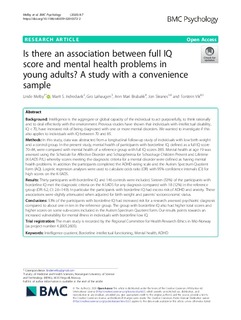| dc.contributor.author | Melby, Linde | |
| dc.contributor.author | Indredavik, Marit Sæbø | |
| dc.contributor.author | Løhaugen, Gro | |
| dc.contributor.author | Brubakk, Ann-Mari | |
| dc.contributor.author | Skranes, Jon Sverre | |
| dc.contributor.author | Vik, Torstein | |
| dc.date.accessioned | 2020-02-03T07:35:42Z | |
| dc.date.available | 2020-02-03T07:35:42Z | |
| dc.date.created | 2020-01-31T13:02:52Z | |
| dc.date.issued | 2020 | |
| dc.identifier.citation | BMC Psychology. 2020, 8 (7) | nb_NO |
| dc.identifier.issn | 2050-7283 | |
| dc.identifier.uri | http://hdl.handle.net/11250/2639147 | |
| dc.description.abstract | Background
Intelligence is the aggregate or global capacity of the individual to act purposefully, to think rationally and to deal effectively with the environment. Previous studies have shown that individuals with intellectual disability, IQ < 70, have increased risk of being diagnosed with one or more mental disorders. We wanted to investigate if this also applies to individuals with IQ between 70 and 85.
Methods
In this study, data was abstracted from a longitudinal follow-up study of individuals with low birth weight and a control group. In the present study, mental health of participants with borderline IQ, defined as a full IQ score 70–84, were compared with mental health of a reference group with full IQ scores ≥85. Mental health at age 19 was assessed using the Schedule for Affective Disorder and Schizophrenia for School-age Children Present and Lifetime (K-SADS P/L) whereby scores meeting the diagnostic criteria for a mental disorder were defined as having mental health problems. In addition the participants completed the ADHD-rating scale and the Autism Spectrum Quotient form (AQ). Logistic regression analyses were used to calculate odds ratio (OR) with 95% confidence intervals (CI) for high scores on the K-SADS.
Results
Thirty participants with borderline IQ and 146 controls were included. Sixteen (53%) of the participants with borderline IQ met the diagnostic criteria on the K-SADS for any diagnosis compared with 18 (12%) in the reference group (OR: 6.2; CI: 2.6–14.9). In particular the participants with borderline IQ had excess risk of ADHD and anxiety. These associations were slightly attenuated when adjusted for birth weight and parents’ socioeconomic status.
Conclusions
53% of the participants with borderline IQ had increased risk for a research assessed psychiatric diagnosis compared to about one in ten in the reference group. The group with borderline IQ also had higher total scores and higher scores on some sub-scores included in the Autism Spectrum Quotient form. Our results points towards an increased vulnerability for mental illness in individuals with borderline low IQ. | nb_NO |
| dc.language.iso | eng | nb_NO |
| dc.publisher | BioMed Central | nb_NO |
| dc.rights | Navngivelse 4.0 Internasjonal | * |
| dc.rights.uri | http://creativecommons.org/licenses/by/4.0/deed.no | * |
| dc.title | Is there an association between full IQ score and mental health problems in young adults? A study with a convenience sample | nb_NO |
| dc.type | Journal article | nb_NO |
| dc.type | Peer reviewed | nb_NO |
| dc.description.version | publishedVersion | nb_NO |
| dc.source.volume | 8 | nb_NO |
| dc.source.journal | BMC Psychology | nb_NO |
| dc.identifier.doi | 10.1186/s40359-020-0372-2 | |
| dc.identifier.cristin | 1788127 | |
| dc.description.localcode | Open Access This article is distributed under the terms of the Creative Commons Attribution 4.0 International License (http://creativecommons.org/licenses/by/4.0/), which permits unrestricted use, distribution, and reproduction in any medium, provided you give appropriate credit to the original author(s) and the source, provide a link to the Creative Commons license, and indicate if changes were made. | nb_NO |
| cristin.unitcode | 194,65,15,0 | |
| cristin.unitname | Institutt for klinisk og molekylær medisin | |
| cristin.ispublished | true | |
| cristin.fulltext | original | |
| cristin.qualitycode | 1 | |

